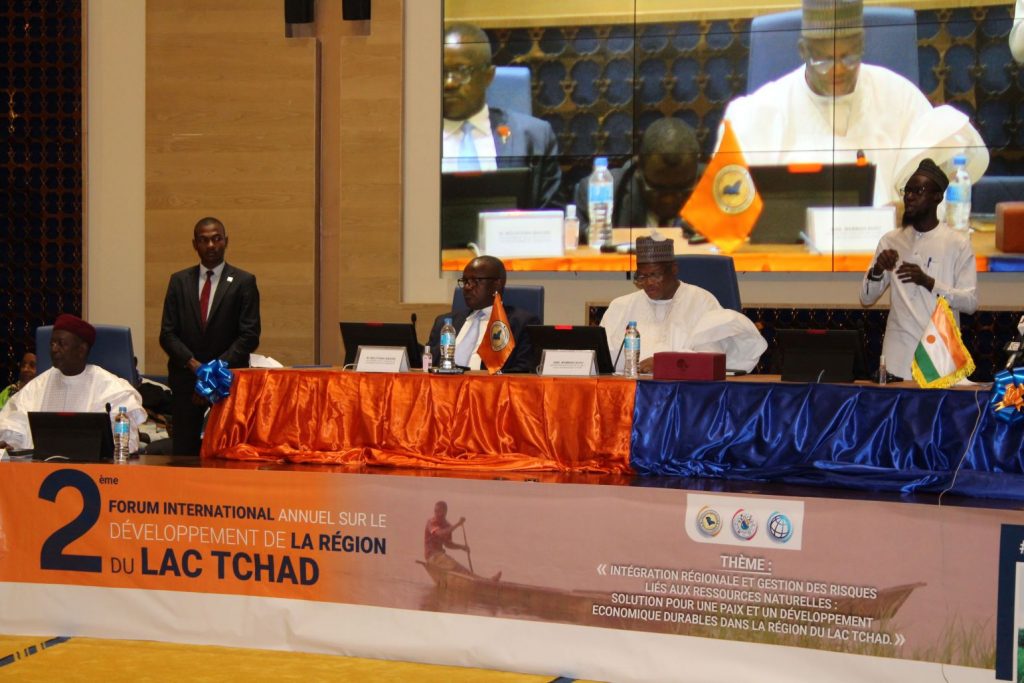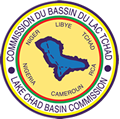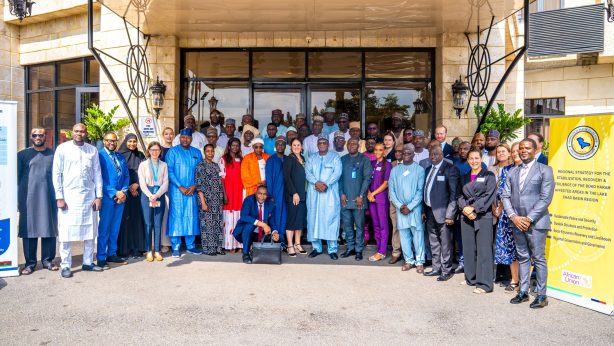Second Annual International Forum on the Development of the Lake Chad Region

The Second Annual International Forum on the Development of the Lake Chad Region opened on Tuesday, 23 May 2023, in Niamey.
The Forum is organised by the Lake Chad Basin Commission and the World Bank on the theme “Regional Integration and Natural Resource Risk Management: Solutions for Sustainable Peace and Economic Development in the Lake Chad Region.”This Forum is only the second, after the maiden edition in Abuja (Nigeria) in April 2022. It aims to take stock of the state of the basin in terms of sustainable development of natural resources, climate resilience, mobility, peace, stability, and regional integration.
For three days, about 300 participants from various works of life concerned about development issues in the Lake Chad region, including Member States, the Executive Secretariat, universities of the basin, researchers, experts and specialists in development, humanitarian and security issues, donors, local authorities, traditional chiefs and religious leaders, women’s, and youth associations, etc.
They will discuss and share ideas, knowledge, experiences and expertise on current challenges and outstanding issues in natural resource management in the context of climate change. They will also consider how this initiative-taking management could contribute to better regional integration, strengthening regional cooperation and solidarity, peacebuilding, stability, security, and sustainable development in this basin which a tangle of complex crises has severely tested.

In his opening remarks, the Prime Minister of the Republic of Niger, Mr OUHOUMOUDOU MAHAMADOU, lauded the relevance of such a theme which is in line with the major challenges facing the Lake Chad region, namely, poverty, insecurity, vulnerability, and fragility. While highlighting the efforts deployed by Member States to curb these crises, which can only be resolved in a coordinated, concerted, inclusive and integrated manner, OUHOUMOUDOU MAHAMADOU urged the panellists to be more committed and to take bold and concrete actions centred on the crucial need to tackle the real causes of the crisis, so that Lake Chad can once again become the “hub of inter-regional trade and trade diversion”.
A situation that is hardly possible today without real “transboundary and inter-regional cooperation but also permanent operational coordination between all the Member States.” According to the Prime Minister, “the governments of LCBC Member States have high hopes for the operational outcomes from these deliberations.” He ended his remarks by promising that he would be attentive to the outcomes of the meeting.
The Executive Secretary of LCBC, Ambassador MAMMAN NUHU, underscored the consistency between this Forum and the pillars of the Regional Strategy for the Stabilization and Recovery of the Basin Areas affected by the Boko Haram crisis. He opportunely recalled how the multidimensional and transboundary nature of the intertwined crises facing Lake Chad led to the holding of the inaugural Lake Chad Basin Governors’ Forum and the development of a Regional Stabilisation Strategy. The strategy called for implementing unifying and inclusive projects to address the root causes of the crisis in the Lake Chad Basin comprehensively and sustainably.
The World Bank funds the Lake Chad Region Recovery and Development Project (PROLAC). It sponsors the Annual International Forum on the Development of the Lake Chad Region – which is precisely one of these structuring and integrating projects. The objectives include strengthening regional collaboration between the four countries bordering Lake Chad and improving the living conditions of the populations, particularly women and young people, who are strongly confronted with the negative consequences of climate change and insecurity. PROLAC supports national and regional coordination platforms, strengthening local capacities, restoring sustainable rural mobility and connectivity, and resuming income-generating agricultural activities.
It will also support knowledge sharing and regional dialogue through a data platform hosted by the Lake Chad Basin Commission and the organisation of an annual international forum bringing together all key actors around a specific theme.
According to the representative of this Bretton Woods Institution, the World Bank “funds about thirty projects of the PROLAC type, with a budget of more than FCFA 600 billion in the entire Sahel region,” said According to Mr Han Fraeters, the World Bank is even more willing, “not to invest but to invest better”, declaring the Bank open to all initiatives aimed at further pooling efforts and energies to solve the Lake Chad Basin crisis holistically and concretely.
The region’s development forum provides just such a platform where policymakers, researchers, development actors, donors and beneficiaries of development actions can come together and learn from what has already been achieved, consolidate efforts to advance comprehensive stabilisation, recovery, and resilience interventions, and improve synergies and collaboration to address the challenges they face.
This Forum is no exception, organised both in-person and virtual. In addition to natural resource management in the context of climate change, interconnectivity and socio-economic development, knowledge management for decision-making, etc., the Forum will also address practical and critical issues for these hard-pressed populations, such as regional integration, infrastructure, transboundary mobility, governance, insecurity, agricultural development, resilience and best practices, social cohesion and inclusion, climate dynamics and flood risk management as well as socio-economic empowerment of youth and women, etc.
It should be noted that proposals and recommendations of the meeting will enrich the Fourth Lake Chad Basin Governors’ Forum, scheduled for July in N’Djamena, Chad.

